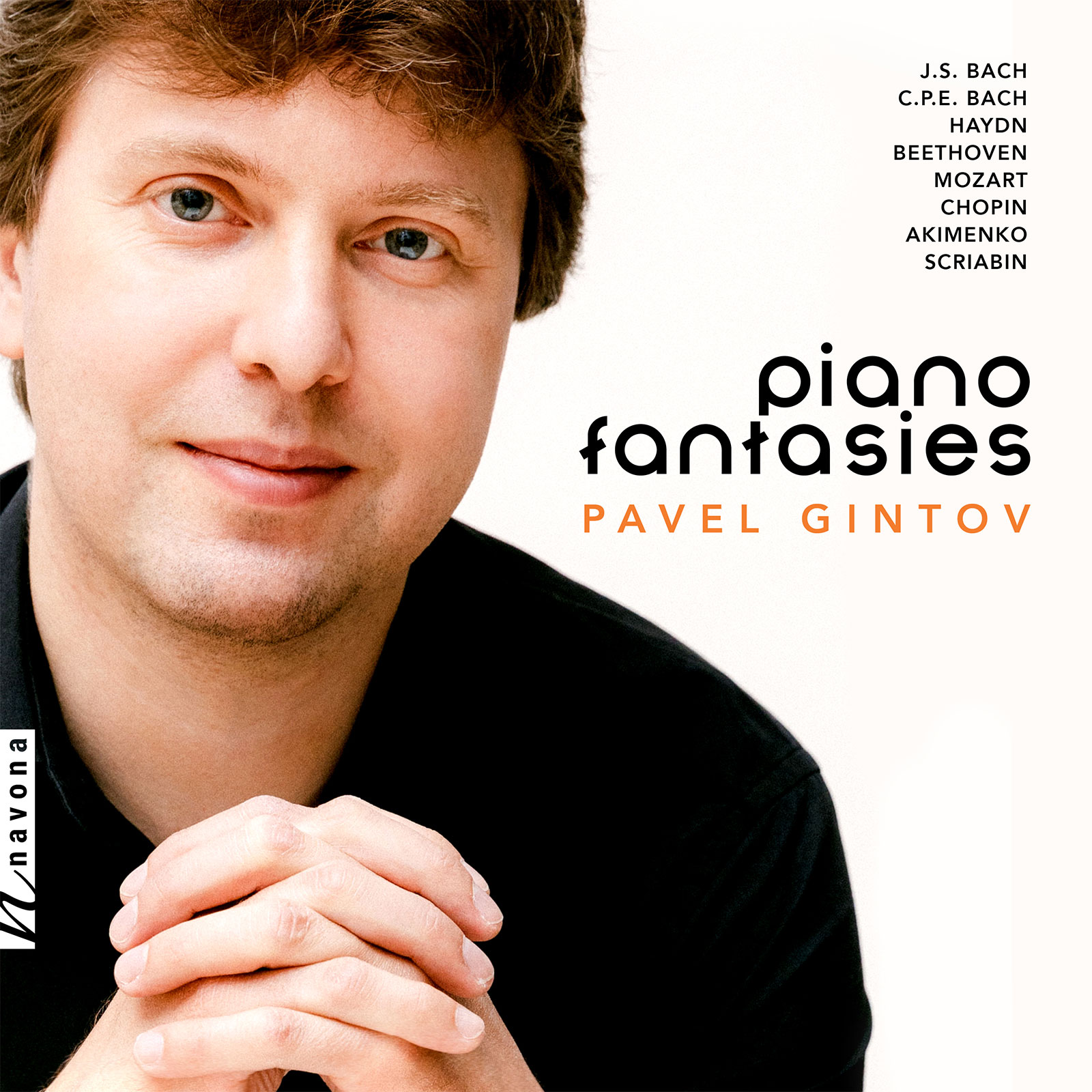Piano Fantasies
Pavel Gintov piano
No other musical form allows the composer as much liberty as the musical fantasy, or fantasia. Ukrainian-born pianist Pavel Gintov iconoclastically blends emotion and reason in his selection of PIANO FANTASIES ranging from the Baroque through to the late Romantic era.
Gintov demonstrates the versatility of the musical fantasy in a remarkable fashion: Mozart, Haydn, Johann Sebastian and Carl Philipp Emanuel Bach are rendered with restrained rationality, as (interestingly) is the latter’s greatest admirer, Ludwig van Beethoven. Ukrainian impressionist gem Akimenko and the colorful Scriabin, on the other hand, glow with exuberant tenderness. Gintov’s greatest revelation, however, arrives in the form of Chopin, whose Fantasy in F Minor is played with such classicist precision that one is instantly reminded of Schubertian depth.
PIANO FANTASIES offers more than a stunning look into the minds of both composers and the performer: it’s a remarkable symbiosis.
Listen
Stream/Buy
Choose your platform
"The program here is balanced and varied."
Gintov certainly illuminates the many strengths of the pieces, while injecting his own sublime presence into a very impressive piano listen.
"Gintov provides harmonic richness for the ears"
Track Listing & Credits
| # | Title | Composer | Performer | |
|---|---|---|---|---|
| 01 | Fantasia in C minor, BWV 906 | Johann Sebastian Bach | Pavel Gintov, piano | 4:15 |
| 02 | Fantasia in C major, H. 284 | Carl Philipp Emanuel Bach | Pavel Gintov, piano | 7:11 |
| 03 | Fantasia in C major, Hob. XVII:4 | Joseph Haydn | Pavel Gintov, piano | 5:16 |
| 04 | Fantasia Op. 77 | Ludwig van Beethoven | Pavel Gintov, piano | 9:04 |
| 05 | Fantasia in F minor, K. 608 | Wolfgang Amadeus Mozart; arr. Pavel Gintov | Pavel Gintov, piano | 9:20 |
| 06 | Fantasy in F minor, Op. 49 | Frederic Chopin | Pavel Gintov, piano | 12:38 |
| 07 | Sonata-Fantasy No. 2, Op. 60: I. Andante. Allegro molto | Theodore Akimenko | Pavel Gintov, piano | 9:22 |
| 08 | Sonata-Fantasy No. 2, Op. 60: II. Larghetto | Theodore Akimenko | Pavel Gintov, piano | 5:16 |
| 09 | Fantasy in B minor, Op. 28 | Alexander Scriabin | Pavel Gintov, piano | 8:43 |
Recorded August 21, October 18, & September 18, 2018 at Martin Patrych Memorial Studios in New York
Recording Session Producer & Engineer Joseph Patrych
Photography by Tanya Isaeva
Executive Producer Bob Lord
Executive A&R Sam Renshaw
A&R Director Brandon MacNeil
A&R Danielle Lewis
General Manager of Audio & Sessions Jan Košulič
Audio Director Lucas Paquette
VP, Design & Marketing Brett Picknell
Art Director Ryan Harrison
Design Edward A. Fleming
Publicity Patrick Niland, Sara Warner
Artist Information

Pavel Gintov
Pianist Pavel Gintov has been described as “a poet of the keyboard” by Marty Lash of the Illinois Entertainer, a “musical storyteller” by the Japanese publication Shikoku News, and “a fantastic pianist and extraordinary artist” by Jerry Dubins of the Fanfare Magazine.
Notes
I have always been fascinated by the genre of fantasy. Fantasies written in the same era and in the same musical style often have very little in common. Even fantasies written by the same composer can be strikingly different. For example, a fantasy by J. S. Bach could be a multi-sectional toccata-like virtuoso piece, a rhapsodic improvisatory piece, or a short piece written in a simple binary form. Classical and Romantic fantasies are even more diverse, ranging from a humorous capriccio-like Fantasy in C major by Haydn to the massive philosophical masterpieces by Schubert and Schumann.
So what is the fantasy as a genre? The only consistent feature that unifies all fantasies is the freedom that can be reflected in their different aspects. This can be a freedom of form, freedom of metric structure, or freedom of tonal plan. Generally, composing a fantasy in all times meant creating something unusual, unpredictable, unique.
For this recording I have chosen eight fantasies written by eight composers in a span of 200 years. Although all of these pieces share the same title, each of them takes us to a completely different world of each composer’s most revolutionary and most personal ideas.
— Pavel Gintov

